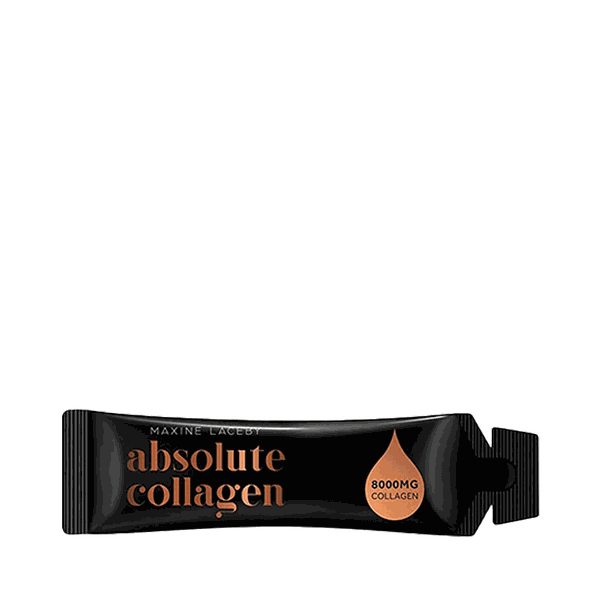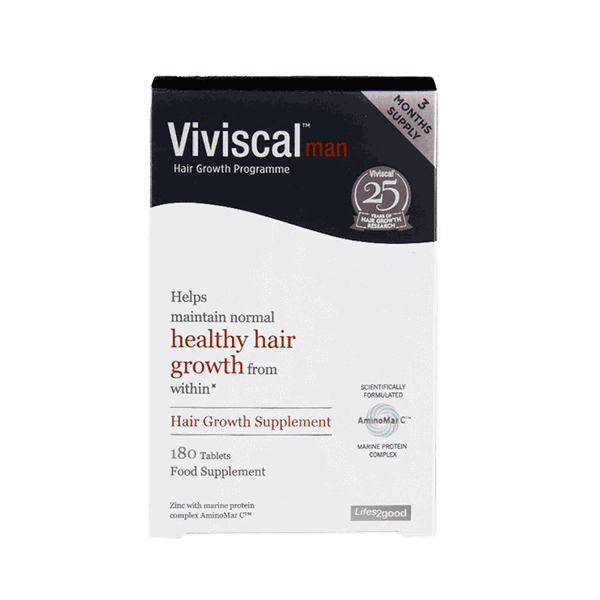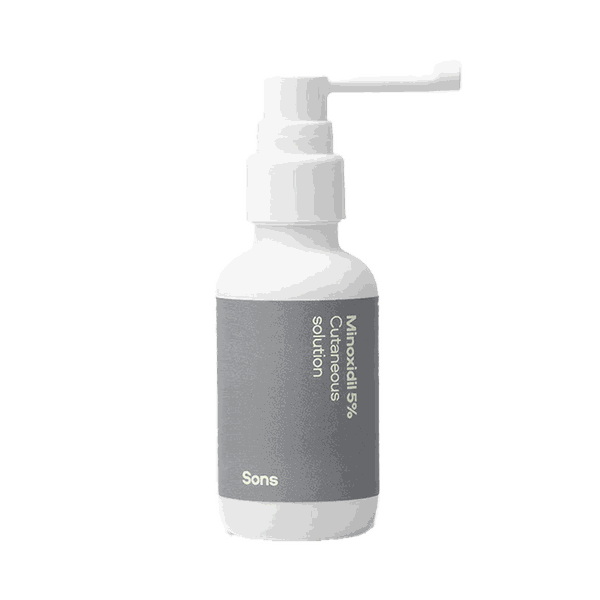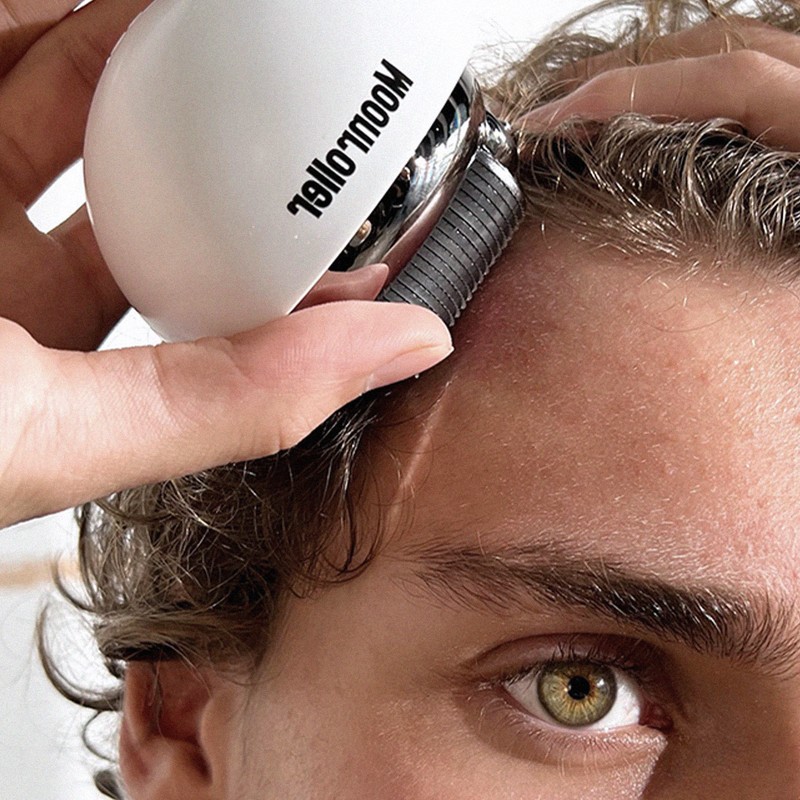How To Fix Thinning Hair
Hormones Play A Part
If your hair isn’t quite as thick as it used to be, you’re not alone. By the age of 60, two-thirds of men will experience male pattern baldness. Dr Furqan Raja, hair transplant surgeon of Harley Street’s The Private Clinic, confirms it’s more unusual for men not to experience some form of hair loss. “Most men will start to notice their hair thinning – either the thickness of the strands themselves or a receding hairline – in their 20s,” he says. “The most common pattern of male hair loss begins at the temples, the front of the scalp above the forehead, and at the crown.”
While your genes play a part, so do your hormones, says Dr Albena Kovacheva, senior surgeon at Harley Street Hair Clinic. “Male hair loss is primarily caused by changing hormone levels and genetics. As you age, your testosterone starts to break down into a hormone known as DHT. The hair on the top of the scalp is particularly sensitive to DHT, and as levels increase, the hair weakens and thins.” That sensitivity is genetic, explains Dr Christopher D'Souza, founder of the D’Souza Clinic: “Some men seem to be more sensitive to the effects of DHT than others.”
Your Hair Is A Reflection Of Your Health
“Hair loss can be accelerated by certain lifestyle factors, so making small changes can help slow the rate of hair loss,” says Albena. “For example, high blood pressure and high cholesterol are linked to early hair loss, as they reduce the supply of oxygen to the scalp and can cause shrinking of the hair follicles. Exercising daily for 30 minutes can help. At the same time, excessive alcohol consumption dehydrates the body, which makes the hair dry, brittle and more prone to breakage. Alcohol also depletes levels of zinc and iron – two key minerals needed to maintain strong hair.” Stress also plays a part, says Furqan. “Stress raises androgen levels, which has been linked to hair loss.”
Diet & Supplements Can Help
If you are in the early stages of hair loss, it’s worth cleaning up your diet and taking the right supplements to support hair follicles at a deeper level – especially if you are vegan, vegetarian or don’t eat as well as you should. “Research shows a lack of vitamin D can lead to hair loss, and when there isn’t enough vitamin D in your system, such as during the winter months, new hair growth can be stunted,” says Furqan.
“Zinc, iron, selenium and biotin are also key players when it comes to healthy hair,” adds Christopher. “In fact, there is good evidence to show a well-balanced diet has a positive impact on your hair.”
Consultant trichologist Eva Proudman says collagen is also worth taking: “I recommend Absolute Collagen to my patients – one small sachet provides 8g of protein, which is the same as one egg. Collagen can be useful in promoting hair growth. Tricoextra, meanwhile, is a clinical supplement that also promises good results, providing the vitamins and minerals needed for a healthy hair cycle.”
An Expert Opinion Is Invaluable
If you’re at all concerned with the amount of hair you’re losing, book in with a trichologist or hair loss expert. “It’s far better to deal with hair loss earlier rather than later,” says Christopher. “The non-surgical side is arguably more important – i.e., slowing down existing hair loss and focusing on the preservation of existing hair. There’s no ideal time for treatment and everyone’s experience is different, but the most important first step is to have a consultation with an expert who can then give you a plan of action.”
It pays to do your research, however, as the hair loss market is rife with under-qualified ‘experts’. “Avoid a clinic where you’re booked in with a sales advocate or ‘advisor’,” warns Christopher. “These are usually non-medical personnel and therefore can’t offer the same level of informed medical advice as a doctor. The British Association of Hair Restoration Surgery (BAHRS) is a great place to start with some very helpful advice.”
Eva also recommends avoiding online subscription plans. “If an expert hasn’t seen you or examined your hair, they have no idea what will work. Remember, one treatment doesn’t suit everyone. For the best results, you need an accurate diagnosis with no pressure on purchasing products or treatment plans.”
Thickening Shampoos Work At A Superficial Level
Most thickening shampoos don’t actually cure thinning hair. It’s impossible for them to promote the growth of new hair, says Albena. “Most products simply change the texture and volume of hair to enhance its appearance. Caffeine shampoos may be worth trying, but the evidence is limited. Caffeine has been proven to stimulate hair growth as it targets DHT, although this process happens internally, meaning a caffeine shampoo won’t have long-term results.”
Patience Is Key
For tangible results, experts agree medication is a sensible first step. Your GP can prescribe you a course of finasteride, a prescription-only medication which blocks production of DHT and is proven to be one of the most effective forms of hair loss treatment. “Traditionally, finasteride was taken in oral form, but it now tends to be prescribed in liquid form and applied directly to the scalp,” adds Furqan. “Finasteride has been shown to be clinically effective in 90% of men with male pattern baldness and around two thirds of men who take it will experience regrowth. A course of two to three months is recommended, but you may not see results until six months.”
Furqan also recommends minoxidil, an over-the-counter topical solution that can be found in products such as Regaine. But don’t expect miracles overnight, don’t be seduced by empty promises, and if a product or medication sounds too good to be true, it probably is, says Eva.
A Transplant Isn’t Your Only Option
Low-level laser therapy is one of the most popular treatments for hair loss at the moment, says Christopher – and it can be done at home. “It stimulates hair growth by emitting a particular wavelength of red light on the scalp. As consistency is key for hair growth results, the system comes as an easy-to-wear band device, so you can build it into your home routine. When looking at a device to use at home, look for ‘laser’ rather than the cheaper option of ‘LED’. However, you need to be consistent with it – wearing the device for 20 minutes every day – to see results. Platelet-rich plasma (PRP) is another treatment option – results vary, but it is one to also consider.”
Albena is a fan of Advanced Tricho Pigmentation (APT), which works like a tattoo to replicate the appearance of hair on the scalp. “It can be used all over the scalp to create the illusion of thicker and fuller hair, can be used to build upon a receding hairline, and even all over the scalp to create the look of a realistic, fully shaven head.”
The Future Of Hair Restoration Is Brighter Than Ever
If a consultant agrees a transplant is your best course of action, know they have come on leaps and bounds in recent years. Here, our experts share their dos and don’ts of getting one…
DO…
Wait Until The Right Time
“You’re only a suitable candidate for a hair transplant if your hair loss is at a stage that’s ready for it. You should avoid having a hair transplant when you are too young as your hair loss pattern can be unpredictable at this stage in life. This makes planning a hair transplant difficult, and you may also not have enough donor hair which will make you ineligible.” – Albena
Research Your Physician
“Black market clinics are still operating in the UK and must be avoided. These clinics prioritise patient turnover and delegate the surgery portion of the treatment to assistants – this is in violation of guidance set out by the General Medical Council (GMC). Choose a surgeon who is a diplomate of the American Board of Hair Restoration Surgery (ABHRS), which is the only recognised qualification in the world for hair transplant surgery. For physicians practising in the UK, I would expect them to also be members of the British Association of Hair Restoration Surgery (BAHRS) and the International Society of Hair Restoration Surgery (ISHRS).” – Christopher
Think About The Psychological Aspect
“Non-surgical treatments – like laser and PRP – can help improve hair thickness, whereas hair transplants can dramatically improve areas of severe loss. Whilst the results of these treatments are usually considered to be purely aesthetic, they also have a huge impact on a person’s self-confidence, and therefore have a significant positive psychological impact too.” – Furqan
Expect Natural Results
“Hair transplant techniques have improved significantly in recent years. Minimally invasive techniques like follicular unit extraction (FUE) have been ground-breaking and overtaken old techniques which led to scarring and long healing times. FUE replaces lost hair by taking healthy follicles from the back or side of the head and transplanting them to a thinning area. Previously, strips of tissue were taken and then cut before being replaced.” – Albena
Chat To Your Surgeon
“It is vital to to meet your hair transplant surgeon before the day of the surgery itself. A thorough history and examination of your scalp should be carried out before any treatment plan is agreed. Long-term planning is crucial to the success of a transplant and there is no one better to do this than your surgeon. Many clinics use salespeople to recommend treatment plans. If you are serious about finding out how to choose the best hair transplant surgeon, it’s imperative to meet them before signing up to treatment.” – Christopher
DON’T…
Expect A Lengthy Procedure
“Hair restoration surgery has come on dramatically, becoming more popular and successful as a result. It involves minimal discomfort and, once the local anaesthetic has been administered, it is generally pain free. The procedure I perform at The Private Clinic is usually performed in one day and you can go home straight afterwards.” – Furqan
Leave It Too Late
“You should deal with hair loss earlier rather than later. The non-surgical side is arguably more important – i.e. slowing down your hair loss and focusing on preserving what you have. Regarding when to proceed with surgery, this will be different for everyone – there are many factors to take into account. A good surgeon will tell you the pros and cons as well as having a view to the long-term results. This is something that is often overlooked.” – Christopher
Panic
“My best advice for anyone struggling with hair loss is not to panic. We are fortunate to live in an age where there are many effective treatment options available. Don’t suffer in silence – book in with a reputable and qualified hair-loss expert to discuss your options.” – Furqan
For more info or to book a consultation with one of our experts, visit HSHairClinic.co.uk, UKHairConsultants.com, TheDSouzaClinic.com & ThePrivateClinic.co.uk
SHOP OUR EDIT








DISCLAIMER: Features published by SLMan are not intended to treat, diagnose, cure or prevent any disease. Always seek the advice of your GP or another qualified healthcare provider for any questions you have regarding a medical condition, and before undertaking any diet, exercise or other health-related programme.
DISCLAIMER: We endeavour to always credit the correct original source of every image we use. If you think a credit may be incorrect, please contact us at [email protected].


